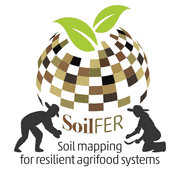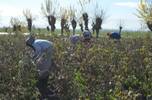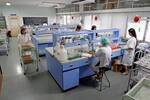SoilFER: Soil mapping for resilient agrifood systems

In Central America and sub-Saharan Africa, the Soil Mapping for Resilient Agrifood Systems (SoilFER) project stands out as a unique framework aimed at unearthing valuable information from soils to guide policymaking and fertilizer recommendations both at national and field scale.
The project's emphasis on strengthening capacities as well as empowering stakeholders with full ownership and control over the data and tools underscore its long-term ambition to sustainably equip both participating governmental institutions and farmers. By providing farmers with digital solutions based on the variability of soils, SoilFER promotes the efficient use of fertilizers, sustainable farming practices and the selection of major and opportunity crops as part of VACS*, positively impacting soil health, agricultural livelihoods and enhancing the resilience of agrifood systems in the five beneficiary countries.

From the ground up: the SoilFER process
 |
Decision support tools | |
| Fertilizer management, major and opportunity crops, Sustainable Soil Management |
||
| Field trials | ||
| Validation of fertilizer recommendations | ||
| Soil data management | ||
| Laboratory information Management system (LIMS) | ||
| Soil laboratories | ||
| Fertilizer testing, wet and dry chemistry | ||
| Soil sampling | ||
| Field data collection tool |
Connecting and fostering collaboration between three core stakeholders

National governments
National governments are provided with robust, rigorous, and responsive framework for integrated soil nutrient management at local, subnational, and national scales.

Farmers
Farmers are empowered with web-based applications, high-resolution nutrient maps and enhanced capacity on sustainable soil management.

Laboratories
Laboratories are strengthened by the implementation of Laboratory Information Management Systems, the modernization of their facilities, and staff capacities development through training.

A four-year project with multiple objectives
Short term: Provide farmers with tools and resources to facilitate data-driven decision-making at the farm level.
Medium term: Advocate for sustainable management practices to enable farmers in preserving and enhancing soil health and fertility through sustainable soil management.
Long term (beyond the project lifetime): Cultivate a sense of ownership and self-sustainability among governments and local stakeholders. The ultimate aim is to establish sustainable soil-crop systems that benefits governments, farmers, and their communities
Expected results
| Improved understanding, databases and maps of soil resources at national and field scale | Digital tools and solutions for improved natural resource and fertilizer management | Governmental institutions are strengthened and empowered in state-of-the-art soil analysis and data management | Farmer capacities are raised for improved fertilizer use, crop selection and sustainable soil management |
